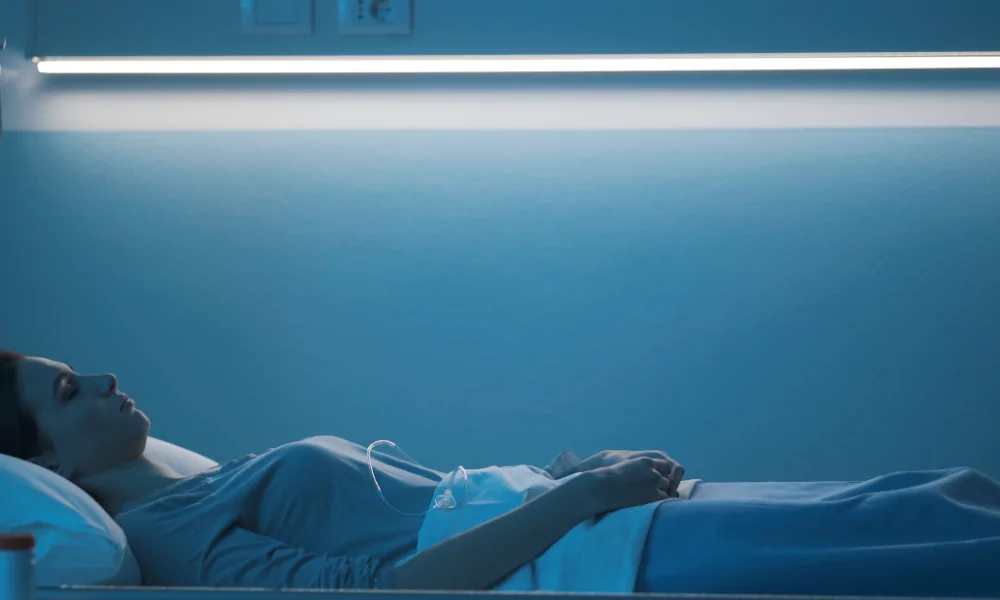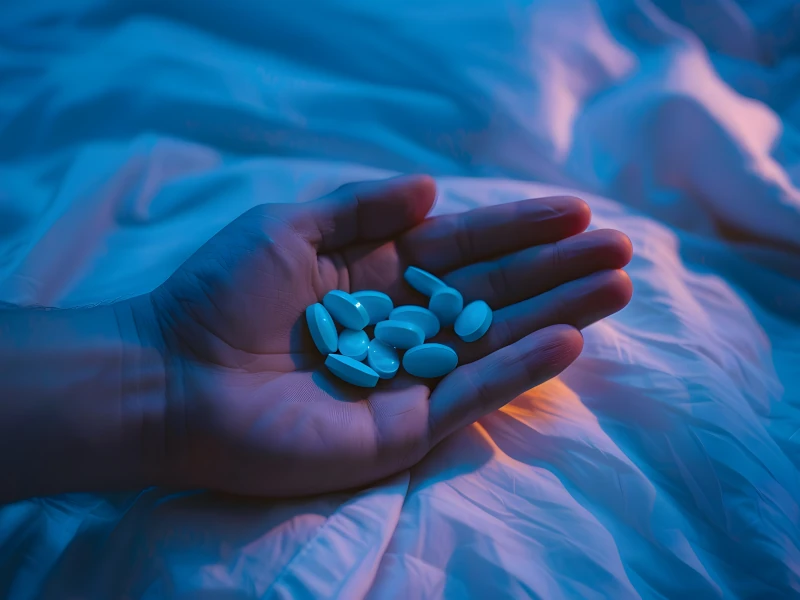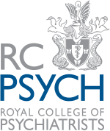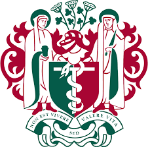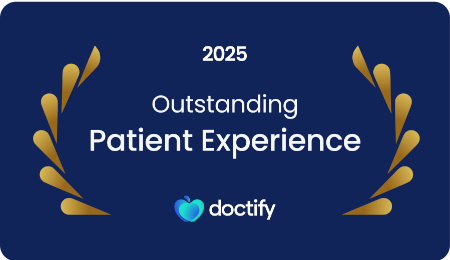Sleep is crucial to our health and well-being, impacting physical and mental functions. Despite its importance, sleep deprivation is affecting a significant portion of the population in the UK. Persistent sleep difficulties can cause various symptoms, including fatigue, cognitive impairment, mood disturbances, and an increased risk of various health issues.
If you’re experiencing persistent sleep difficulties, a sleep study can be invaluable in diagnosing and treating underlying sleep disorders, ultimately improving your quality of life. This article will discuss the concept of sleep study and its use to identify and understand various sleep disorders by monitoring physiological parameters during sleep.
What is a sleep study?
A sleep study is a diagnostic test to evaluate and identify potential sleep disorders by monitoring various physiological parameters during sleep. The data gathered during a sleep study provides insights into the quality and stages of sleep, allowing for the accurate diagnosis of sleep disorders. There are two main types of sleep studies:
Polysomnography (full sleep study): This comprehensive test is typically conducted in a sleep lab or hospital setting under the supervision of trained sleep technicians. Learn more about Polysomnography.
Home sleep testing: This type of sleep study is designed to evaluate specific sleep disorders, primarily obstructive sleep apnoea, in the comfort of the patient’s home environment. Learn more about home sleep testing.
Both types of sleep studies are conducted under the guidance of trained sleep technicians, who are responsible for setting up the necessary equipment, monitoring the patient during the study, and interpreting the collected data. The results of a sleep study provide valuable information to healthcare professionals in diagnosing and developing appropriate treatment plans for sleep-related disorders.
How does a sleep study work?
During a polysomnography (full sleep study), trained sleep technicians attach electrodes and sensors to the patient’s body to monitor various biological functions. This includes electroencephalography (EEG) to measure brain waves, electrooculography (EOG) to track eye movements, and electromyography (EMG) to assess muscle activity.
Throughout the night, the sleep technicians observe and record the patient’s sleep patterns, paying close attention to the different stages of sleep: rapid eye movement (REM) and non-REM sleep. The non-REM sleep stage is further divided into three distinct phases: N1 (light sleep), N2 (also light sleep), and N3 (deep sleep). Each stage serves a unique purpose in the sleep cycle and is characterised by distinct brain wave patterns, eye movements, and muscle activity. A sleep study may involve other vital signs, such as oxygen levels, heart rate, and respiratory effort. This comprehensive approach allows sleep specialists to thoroughly understand the patient’s sleep health and identify potential sleep-related breathing disorders. Polysomnography is considered the gold standard for diagnosing sleep disorders such as sleep apnoea, narcolepsy, periodic limb movement disorder, and others.
In contrast, home sleep tests typically involve wearing a simplified monitoring device overnight, often for multiple nights. These devices capture physiological parameters, such as respiratory effort, airflow, and oxygen saturation levels. While they are less comprehensive than a full sleep study, home sleep tests are well-suited for diagnosing obstructive sleep apnoea, a condition characterised by interrupted breathing during sleep.
What happens during a sleep study?
Undergoing a sleep study in a sleep lab involves the following steps:
Arrival and preparation: Upon arrival at the sleep lab, a technician will greet you and explain the procedures. They will ask you about your sleep habits, medical history, and any specific concerns you may have. Once the initial consultation is complete, the technician will attach electrodes and sensors to your body.
Sleep monitoring: After the setup, you will be instructed to sleep as usual while the technicians monitor your sleep patterns throughout the night from an adjacent room. During the night, the technicians will closely observe and record your sleep patterns, noting any abnormalities or events that may indicate the presence of a sleep disorder.
Morning routine and follow-up: The technicians will gently wake you and remove the monitoring equipment in the morning. You can then follow your usual morning routine.
After the analysis, the sleep specialist will provide a comprehensive report and diagnosis. They will also recommend appropriate treatment options, including lifestyle modifications, continuous positive airway pressure (CPAP) therapy, oral appliances, or other interventions depending on the specific sleep disorder identified.
If you choose to undergo a home sleep test, you will typically receive instructions on how to set up and use a monitoring device at home. The device will record your sleep patterns over one more nights, after which you will return it to the sleep clinic or healthcare provider for analysis by a sleep specialist. It is important to note that while home sleep tests are convenient and less intrusive, they may have limitations compared to a full sleep study. They may not capture all the necessary data to diagnose certain sleep disorders, particularly those related to sleep stages or movements. In cases where a more comprehensive evaluation is required, a full sleep study in a sleep lab may be recommended.
What can a sleep study diagnose?
Sleep studies are invaluable in diagnosing various sleep disorders, each with unique symptoms and underlying causes. Some of the most common sleep disorders that can be identified through a sleep study include:
Obstructive Sleep Apnoea (OSA): Characterised by repeated breathing interruptions during sleep, OSA often accompanied by snoring and gasping. These breathing pauses can occur due to a partial or complete blockage of the upper airway, resulting in decreased oxygen levels and fragmented sleep.
Insomnia: A persistent difficulty falling or staying asleep, leading to poor sleep quality and daytime fatigue. Insomnia can have various underlying causes, including stress, anxiety, medical conditions, or poor sleep habits.
Restless Leg Syndrome (RLS): RLS is an irresistible urge to move the legs, often accompanied by uncomfortable sensations such as tingling, crawling, or aching. These sensations typically intensify during rest or inactivity and can significantly interfere with sleep onset and maintenance.
Narcolepsy: A chronic neurological disorder characterised by excessive daytime sleepiness and sudden, uncontrollable sleep episodes. Individuals with narcolepsy may also experience symptoms such as sleep paralysis, hallucinations, and cataplexy (sudden loss of muscle tone).
Parasomnias: Parasomnia is an abnormal behaviours or experiences that occur during sleep, such as sleepwalking, night terrors, or sleep paralysis.
Sleep-Related Breathing Disorders: Sleep studies can also diagnose other breathing-related sleep disorders, such as central sleep apnoea, which occurs due to a lack of respiratory effort, and sleep-related hypoventilation.
How long is a sleep study?
The duration of a sleep study can vary depending on the specific type and the individual’s needs. However, a typical polysomnography (full sleep study) lasts one night, during which the patient’s sleep patterns are monitored throughout the entire sleep cycle. In some cases, additional nights may required for a more comprehensive evaluation, particularly if the initial study results are inconclusive or if the sleep technicians need to explore different sleep positions or environments to better understand the patient’s sleep patterns. During the study, patients are encouraged to maintain their regular sleep schedule as closely as possible to obtain an accurate representation of their typical sleep patterns.
On the other hand, home sleep tests may involve monitoring for multiple consecutive nights to gather sufficient data for accurate analysis. The number of nights required can vary but typically ranges from two to seven nights, depending on the specific device and the instructions provided by the sleep clinic or healthcare provider. It’s important to note that home sleep tests are designed to capture specific sleep-related parameters, such as breathing patterns and oxygen levels, rather than providing a comprehensive evaluation of sleep stages and sleep architecture.
Considering a sleep study?
If you’re experiencing persistent sleep problems, such as excessive daytime fatigue, loud snoring, gasping episodes during sleep, or difficulty falling or staying asleep, a sleep study can provide invaluable insights into the underlying cause. By undergoing a sleep study and receiving an accurate diagnosis, you can take proactive steps to address the underlying issue and improve your overall well-being. Effective treatment of sleep disorders can lead to many benefits, including:
- Improved energy levels and enhanced cognitive abilities, including memory, concentration, and decision-making.
- Better mood regulation and emotional well-being, alleviating symptoms of depression and anxiety.
- Reduced risk of health complications like cardiovascular disease, stroke, diabetes, and obesity.
- Overall, improved quality of life, productivity, and general well-being.
If you suspect you may be suffering from a sleep disorder, consult with your healthcare provider about the possibility of undergoing a sleep study. They can guide you through the process, provide recommendations based on your specific symptoms and medical history, and help you understand the potential benefits of addressing your sleep issues.
How can Dr Mistry help?
It is important to ascertain the cause of disturbed sleep as soon as possible to allow for prompt treatment. As a leading sleep physician and psychiatrist, we offer consultations for those struggling to sleep. As part of a comprehensive package of care, we also offer sleep investigations with nationwide coverage (in the UK) that can take place in the comfort of your own home, including home sleep apnoea tests and home sleep studies (polysomnography / PSG).
If you suspect that you or a loved one are struggling with poor sleep, please do not hesitate to contact us for further information.
